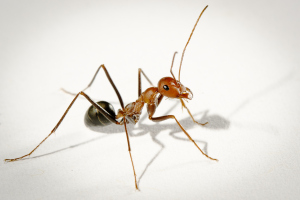
Robohub.org
Insect-inspired navigation with Michael Mangan

In this episode Per talks to Michael Mangan from the University of Edinburgh about using robotics to study and replicate insect behaviour. Mangan describes his studies of desert ants, that are able to accurately navigate arduous environments despite having a very small brain (less than 400 000 neurons). This is an interesting problem as the desert environment is very challenging, it is too hot for pheromone navigation and nearly featureless, making visual navigation difficult.
Michael Mangan
 Michael Mangan started by training as an avionics engineer at the University of Glasgow, later deciding to specialize in robotics after taking a course. At that time he was particularly inspired by some of the biorobotics projects in the press such as MIT’s Robot Tuna and Penguin Boat. He was very interested in this approach promising improved performance for engineering tasks by taking inspiration from biological systems solving similar problems.
Michael Mangan started by training as an avionics engineer at the University of Glasgow, later deciding to specialize in robotics after taking a course. At that time he was particularly inspired by some of the biorobotics projects in the press such as MIT’s Robot Tuna and Penguin Boat. He was very interested in this approach promising improved performance for engineering tasks by taking inspiration from biological systems solving similar problems.
Keen to work in this area he then moved to the Insect Robotics Lab, at the University of Edinburgh to undertake a PhD with Prof. Barbara Webb (see previous podcast interview). This lab combines robotics techniques with animal behavioural experiments in a synergistic loop aimed at revealing how these organisms achieve such impressive behaviors, despite their limited neural hardware and often low-resolution sensory systems. Revealing the parsimonious techniques used by these animals may then allow us to apply them to robotic systems.
 Mangan’s current research focuses on the navigational abilities of desert ants. These ants scavenge for food over long distances despite searing surface temperatures when pheromone trails evaporate too quickly to use for guidance. Instead the ants rely mainly on visual cues for guidance. He has recently documented the impressive individual route following behavior of desert ants in southern Spain, and mapped their habitat for the first time. This has allowed the first rigorous testing of robotic and biologically plausible models of navigation in the ant world, as viewed by the ant.
Mangan’s current research focuses on the navigational abilities of desert ants. These ants scavenge for food over long distances despite searing surface temperatures when pheromone trails evaporate too quickly to use for guidance. Instead the ants rely mainly on visual cues for guidance. He has recently documented the impressive individual route following behavior of desert ants in southern Spain, and mapped their habitat for the first time. This has allowed the first rigorous testing of robotic and biologically plausible models of navigation in the ant world, as viewed by the ant.
Mangan is currently constructing these virtual worlds for public use and they will be available from www.AntNav.org. This webpage is currently under development but he hopes to have initial data uploaded soon, so stay tuned.
Links:
- Download mp3 (17.7MB)
- Subscribe to Robots using iTunes
- Subscribe to Robots using RSS
- Michael Mangan’s Website
- AntNav Website
tags: bio-inspired, podcast



